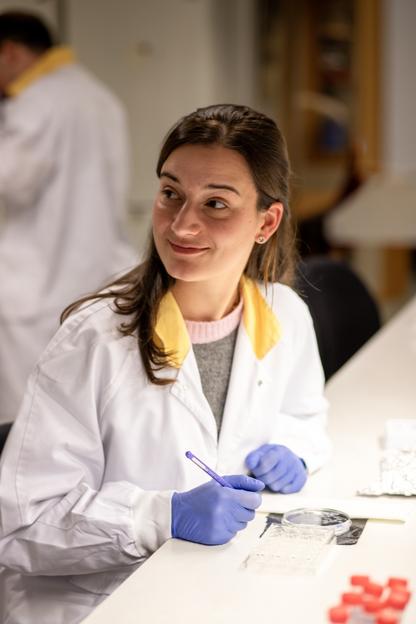
Meet Doctoral Student Júlia Teixidor Deulofeu
In 2021, Júlia moved to Sweden and embarked on a new professional journey, first on an internship and then as a research assistant at the Department of Physiology. She is currently pursuing her PhD as a doctoral student. Júlia is part of a research group which focuses on understanding the mechanistic aspects of how pharmacological treatment addresses overweight and obesity at the neurological level.
How did you become interested in research?
"Biomedical research has always captivated my interest, as I find it fascinating to learn how the human body functions and how diseases work. For this reason, I pursued a bachelor’s degree in pharmacy, followed by a master’s in biomedical research and a Master of Science in Hospital Pharmaceutical Sciences."
"Through my studies, I have gained knowledge of the molecular aspects of our organisms and illnesses from a physiological perspective. After finishing my Master's, I wanted to dive deeper into research. Thus, I decided to go for a Ph.D. It just felt like the next logical and exciting step in my professional journey."
Tell us briefly about your dissertation project.
"My group focuses on understanding the mechanistic aspects of how pharmacological treatment addresses overweight and obesity at the neurological level. This research is crucial to study because overweight and obesity are linked to the onset of various diseases, including type 2 diabetes, cardiovascular disease, cancer, and arthritis."
"The overarching goal of my PhD project is to comprehensively understand the brain-mediated effects of long-acting GLP-1 analogues on food intake and nausea. My research aims to identify and manipulate the activity of neurons responding to GLP-1 analogue treatment. These drugs, known for their effective weight-reducing effects, are relatively new, and their precise impact on the brain, particularly the involved neuronal structures related to satiety and reward regulation, remains unclear. The goal is to uncover the mechanistic details of how the long-acting GLP-1 analogues, specifically semaglutide, act in the brain."

What has been the most fun and/or exciting part of your dissertation work so far?
"The most fun aspect of my dissertation work has been the continuous journey of learning new things daily. Going deep into my research has expanded my knowledge and techniques and allowed me to meet and collaborate with fascinating people. It is collaborative work, which is particularly fulfilling, as it has allowed me to exchange ideas and perspectives with other researchers. Overall, the combination of continuous learning and a supportive research environment has made my dissertation work a rewarding and exciting experience."
What does a typical day look like for you as a doctoral student?
"What I find most enjoyable about being a doctoral student is the diversity in my daily routine. On some days, I spend all my time in the animal facility, conducting in vivo experiments, while others are spent in the wet lab performing histology, for example. In addition, I attend courses and have regular meetings or workshops with colleagues and supervisors."
"I value the moments when I can sit at my computer, organize all my experiments, and think and plan for new ones. Above all, I try to prioritize finding time for lunch with my colleagues, allowing us to share our days!"



What do you hope the results will lead to?
The results obtained may hold significance for future therapeutic approaches targeting obesity and potential nausea treatments. Additionally, the project may contribute valuable insights to the broader research areas of homeostatic control of appetite and aversion and pave the way for developing more effective treatment strategies in the future.
Have you encountered any challenges during your first years as a doctoral student?
For sure! The first years of my Ph.D. have been a rollercoaster. There were times when I felt overwhelmed with work and stressed out, but there were also moments when I was thrilled and glad to be here. Learning new techniques in the lab has presented its own set of challenges. Questions like, 'Am I prepared to do this alone?' and 'Will I do it correctly?' often crossed my mind. In vivo experiments not working? That's been a thing, too. But you know, it's all part of the job. I've learned to take the next step when things don’t go as planned and move on to the next hypothesis. It's been challenging, no doubt, but it's also very gratifying when things are working out.
Is there anything in particular that you think one should think about or be aware of before starting doctoral studies in general or in your particular field?
- Before you jump into a Ph.D., especially in my field, be ready because it takes a long time and a lot of effort. The work doesn't magically disappear when you leave the lab or take a break. It's a 24/7 job, and sometimes switching off is tough, but you need to put a limit. However, you're constantly discovering new stuff about your research, which is super cool. It's a bit of a wild demanding ride, but the excitement of constant exploration makes it all pretty awesome.
Facts about Julia
Educational background
- Bachelor of Pharmacy at the Faculty of Pharmacy and Food Sciences, University of Barcelona.
- Erasmus internship at the Faculty of Pharmacy and Medicine, University of Coimbra, Portugal.
- Master of Science in Hospital Pharmaceutical Sciences from Cardenal Herrera University (UCH-CEU) in Barcelona.
- Master of Science in Biomedical Research from Pompeu Fabra University in Barcelona.
Work experience
- Pharmacy Assistant in a pharmacy office in Platja d’Aro, Girona
- Pharmacist at a pharmacy office in Barcelona
Current position
Doctoral student at the Department of Physiology (started in February 2022)
Interests
- Spending time outdoors, soaking up nature
- Running or swimming when possible
- Spending quality time with my family and friends, creating cherished memories to keep things balanced
- I used to play the piano and the flute a lot, but my schedule has become more demanding.
